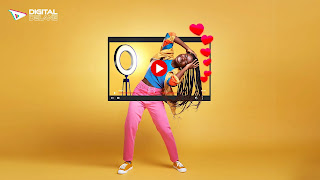The Future Of Digital Marketing in INDIA
New platforms, tools, and techniques continue to emerge, giving marketers even more opportunities to connect with their target audience.
From big data and blockchain to AI and augmented reality, the future of digital marketing will allow digital marketers to increase personalization and reach customers in new ways.-- Neil Patel
The future of digital marketing is shaped by emerging technologies, changing consumer behaviors, and advancements in data analysis. Here are key trends and developments expected to define digital marketing in the near future:
1. AI-Powered Marketing:
- Personalization at Scale: AI will enable highly personalized customer experiences, delivering real-time content and offers tailored to individual preferences.
- Chatbots and Virtual Assistants: Improved AI-driven tools will provide 24/7 customer support and lead nurturing.
- Content Creation: AI tools like ChatGPT are revolutionizing the creation of content, helping marketers generate blogs, social media posts, and ad copy efficiently.
2. Voice and Visual Search:
- Voice Search Optimization: As smart speakers and voice assistants gain popularity, optimizing content for voice queries (conversational and long-tail keywords) will become critical.
- Visual Search: Tools like Google Lens allow users to search via images. Brands will focus on optimizing product visuals for search.
3. The Rise of Short-Form Video:
- Platforms like TikTok, Instagram Reels, and YouTube Shorts have cemented the importance of short, engaging video content. Marketers will continue leveraging this format for storytelling, brand awareness, and customer engagement.
4. Privacy-First Marketing:
- With stricter regulations (e.g., GDPR, CCPA) and the phasing out of third-party cookies, marketers will adopt strategies like:
- First-party data collection through owned channels.
- Contextual advertising targeting users based on content consumption.
- Transparent and ethical data usage policies to build trust.
5. Omnichannel Marketing:
- Seamlessly integrating marketing efforts across channels (email, social media, websites, offline) will enhance customer experiences. Platforms like CDPs (Customer Data Platforms) will aid in unifying data across touchpoints.
6. Augmented Reality (AR) and Virtual Reality (VR):
- AR for E-Commerce: Virtual try-ons for apparel, accessories, and furniture will enhance online shopping.
- Immersive Ads: Brands will explore VR experiences for deeper engagement, especially in sectors like real estate, travel, and entertainment.
7. Influencer Marketing Evolution:
- Micro and nano-influencers will continue to gain traction due to their authentic and niche audience connections.
- AI-driven platforms will assist brands in identifying the best-fit influencers and measuring ROI effectively.
8. Sustainability and Ethical Marketing:
- As consumers prioritize sustainability, brands will highlight eco-friendly practices and values in their marketing efforts. Authentic storytelling around social responsibility will resonate more.
9. Growth of Web3 and Blockchain:
- Decentralized Marketing: Web3 technologies (like NFTs and blockchain) may empower creators and users to participate in and benefit from digital marketing campaigns.
- Tokenized Communities: Brands might reward loyal customers with tokens or NFTs for engagement.
10. Interactive and Gamified Content:
- Quizzes, polls, AR filters, and gamified experiences will increase engagement and make marketing more participatory.
Summary:
Digital marketing increasingly relies on data-driven insights, AI technologies, and ethical practices to create meaningful, customer-centric strategies. Marketers will need to stay agile and adaptive, embracing technological innovations to remain competitive.
The following video is an example of the gist of above topic:















Comments
Post a Comment